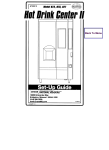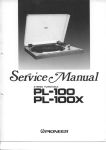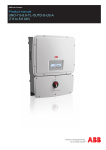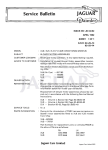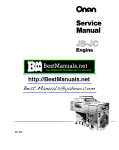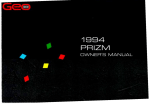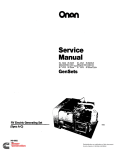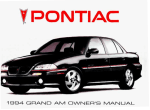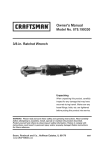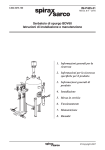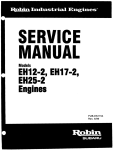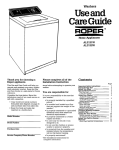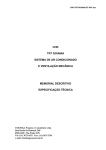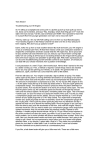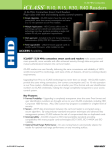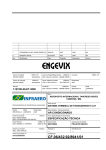Download V12 Engine Service Manual
Transcript
V12 Engine Service Manual CON TENTS Section Foreword I II ................ ................ Page SRO Title ........................................................................... Service Tools& Equipment ........................................................... Torque Tightening Specifications ....................................................... ii iii vi ............... ServiceMaterials ..................................................................... x IV ............... Service Data ....................................................................... xi 1 ................ General Description .................................................................. 1 1.1 .............. Construction ........................................................................ 1 7.2 .............. Full-flow Oilsystem ................................................................. 1 1.3 .............. Crankcase Breather ................................................................... 2 1.4 .............. CoolingSystem ...................................................................... 2 2 2 ................ Service Procedures ................................................................... 2.1 .............. Sealants ............................................................................ 2 3 3 ................ Fault Diagnosis ...................................................................... 3.7 .............. Introduction ......................................................................... 3 3.2 .............. Diagnostic Procedures ................................................................ 3 4 ................ Service Operations ................................................................... 7 4.1 .............. Camshaft. Renew .............................................. 12.13.02-LH ......... 7 111 4.2 .................................. .............. Camshaft Cover Gasket, Renew .............. Valve Clearance, Check and Adjust ............................... 4.4 .............. Cylinder Head, Overhaul ........................................ 4.5 .............. Spark Plug Insert Fitting ......................................... 4.6 .............. Drive-plate, Renew ............................................ 4.7 .............. Crankshaft Damperand Pulley, Renew ............................ 4.8 .............. Crankshaft Front Oil Seal, Renew ................................. 4.9 .............. Crankshaft Rear Oil Seal, Renew ................................. 4.10 ............. Engine Cover, Renew ........................................... 4.11 ............. Cylinder Head Gasket, Renew ................................... 4.3 4.12 ............. Camshaft Sprocket. Renew 12.13.03-RH 12.29.43-LH ......... 7 ......... 9 ......... 9 12.29.44-RH 12.29.48 ............ I O ............ 11 12.29.78 ............ 16 12.29.21 12.53.13 12.27.01 12.21.74 12.21.20 ............ 17 ............ 18 ............ 19 ............20 ............ 21 ........ 22 12.29.03-RH ........ 22 ........................................................... 24 i 72.29.93 12.29.02-LH Issue 1 August 1994 V12 Engine Service Manual FOREWORD This Service Manual has been designed t o enable the skilled Jaguar technician to correctly service and repair the Jaguar 6.0liter V I 2 engine. It assumes that the engine has been removed from the vehicle, in accordance with the Vehicle Service Manual, and is in a clean condition and all service tools and materials are available. A n index can be found at the rear of the manual. Issue 1 August 1994 ii V12 Engine Service Manual @ S€RVIC€ TOOLS & EQUIPMENT Jaguar Number Illustration 18G 55A 0 7 - 7 Description Piston ring compressor 18G 1432 Valve guide remover / replacer 18G 1436lA Crank pulley remover and timing damper oil pressure simulator 18G 1465 Engine lifting bracket c3993 Camshaft timing jig JD 3 8 Damper setting jig JD 3 9 Jackshaft setting jig JD 40 Camshaft sprocket retainer JD 41 Cylinder sleeve retainers 0 0 iii Issue 1 August 1994 V12 Engine Service Manual Illustration not illustrated Issue 1 August 1994 Jaguar Number Description JD 50 Timing chain tensioner retainer JD 128 Crank front seal remover JD 129 Crank front seal replacer JD 181 Fuel injection pressure test kit JD 183 Quick-fit pipe disconnecting tool JD 6118C Valve spring compressor JD 61 18C-2 Adapter for valve spring compressor MS 53C Engine support beam MS 768 Basic handle set iv Notes V12 Engine Service Manual 0 Illustration Jaguar Numbc ns 150-8 0 Description Expandable pilot AS 204 Valve seat adjustable cutter ills 621 Valve seat adjustable cutter ills 1519A Valve spring compressor ills 1520 Engine stand AS 1520-1 Engine stand, add-on for V12 engine AS 1520-2 Adapter assembly for MS 1520 AS 1520-3 Adapter assembly for MS 1520-1 IA 992 'Snap-On' Oil filter canister removal tool Notes 0 not illustrated V Issue 1 August 1994 V12 Engine Service Manual 11. TORQUE TIGHTENING SP€ClFlCATlONS Fixing Tightening Torque (Nm) Air Cleaner Hose clamp, hose t o air cleaner and elbow Air Conditioning Compressor Mounting 3- 4 22 - 28 17 - 23 Adjuster sleeve to mounting bracket Belt tension bracket to tappet block I Bracket t o camshaft cover Compressor to mounting plate 22 - 28 22 - 28 Air Injection Pump Adjuster bolt to pump 30 - 40 22 - 28 34 - 46 10,5 - 13,5 Adjuster screw to pump Air pipe assembly setscrew Air pipe to intake manifold Check valve Hose clamp, air pipe to check valve 30 - 40 2,5 - 3.5 Nyloc nut Pump front mounting bracket bolt Pump pivot bolt 22 - 28 17 - 23 22 - 28 34 - 4 6 Pump side mounting bracket bolt I Connecting Rod 50 - 60 I Connecting rod nut Cooling System Fan drive unit pulley nut Fan drive unit pulley stud 13- 17 17 - 23 Fan to fan drive unit Heater offtake adapter 17 23 32 - 38 - - 3,5 - 3,5 17 - 23 22 - 28 8,5 - 11,5 17 - 23 17 - 23 22 - 28 Hose clamp, bypass pipe to water pump Hose clamp, ISCV to tee piece on water housing 2,5 2,5 Inlet spout to water pump Temperature switch to water rail 1 Water pump assembly screw I Water pump casing to timing cover Water pump plate t o timing cover Water pump t o cylinder block Water pump t o timing cover Crankshaft 17 - 23 180 - 220 85- 105 14- 18 8,5 11.5 1 4 - 18 Damper bolt Drive-plate to crankshaft I Pulley damper bolt I Timing disc setscrew - I Turning plate to pulley Issue 1 August 1994 vi V12 Engine Service Manual lightening Torque Fixing (Nrn) Cylinder Block I I Air iniection .DumD . connector bracket to cvlinder block 318 in. UNF nut Bearing caD to cvlinder block (1/2 in. diameter stud) Bearing - cap to cylinder block (3/8 in. diameter short stud) ! Bearing cap to cylinder block (318 in. diameter long stud) Bearing cap to cylinder block (nut) Cylinder head to cylinder block (7/16 in. diameter stud) Cylinder head to cylinder block (318 in. diameter stud) ' Oil filter face plug Oil gallery rear plug Undershield nut Cylinder Head and Camshaft Cover Camshaft bearing cap stud Camshaft bearing cap to tappet block Camshaft cover bolt Camshaft cover screw ~ - ~ I I Camshaft position sensor Coupling assembly to camshaft Cylinder head to cylinder block (domed nut) ! - Tappet block to cylinder head (nut) Tappet block to cylinder head (socket screw) Tappet block to cylinder head (stud) Dipstick Tube Dipstick tube t o throttle body 4- 5 Drive Chain System Camshaft position sensor Chain tensioner setscrew I 13- 17 10,5 - 13,5 17 - 23 8,5- 11,5 5- 7 22 - 28 64 - 78 34 - 42 22 - 28 13- 17 17 - 23 13- 17 17 23 17 - 23 22 - 28 13- 17 Cylinder head to cylinder block (nut) Cylinder head to timing cover Exhaust manifold stud Exhaust manifold t o cylinder head Intake manifold stud Intake manifold to cylinder head 0 5- 7 34 - 46 23 - 31 13- 17 13- 17 76,5 - 93,5 23 31 6- 8 5- 7 85- 115 76,5 - 93,5 5- 7 22 - 28 22 - 28 43 - 57 10,5 - 13,5 22 - 28 22 - 28 Damper assembly upper bracket bolt Idler shaft retention Sprocket to auxiliary shaft Thrust plate to cylinder block Upper chain tensioner bolt Engine Mountings Heatshield t o hydraulic mount Exhaust Manifold 4- 5 13- 17 17 - 23 34 46 3/8 in. diameter stud Front heatshield setscrew Rear heatshield setscrew - Fuel rail t o manifold 8,5 vi i - 11,5 Issue 1 August 1994 V12 Engine Service Manual Fixing Tightening Torque (Nm) I Generator Mounting I Adjuster sleeve to adjuster bracket Adjuster to generator Cylinder block to timing cover bracket 34 - 46 17 - 23 17 - 23 43 - 57 Generator mounting bracket pivot bolt 34 - 46 ~ Adjuster sleeve nut Intake Manifold Top cover mounting stud Elbow t o intake manifold Intake manifold stud 8,5-11,5 8,5-11,5 8.5 - 11,5 4- 5 4- 5 Throttle housing to intake manifold Throttle stop screw locknut Manifold Ends Intake manifold connector bracket screw Manifold end connector assembly Vacuum take-off screw 7- 10 13- 17 8.5-11,5 Oil Cooler Hose clamp, oil cooler hose to radiator cradle Oil cooler pipe clamp plate nut 7- 10 15,5 - 20,5 2,5 - 3,5 Oil cooler pipe connector Oil cooler pipes to engine Oil cooler to body Oil Pump, Filter and Oil Pan Baffle plate to sandwich t o cylinder block Clamp bracket setscrew Cover housing bolt Cylinder block support bracket setscrew Delivery elbow to oil pump Oil filter canister Oil filter head to cylinder block Oil pan adapter setscrew Oil pan drain plug Oil pan sandwich blanking plate setscrew Oil pan sandwich to cylinder block Oil pan to oil pan sandwich Oil pan to sandwich and cylinder block Oil pipe bracket setscrew Outlet elbow bolt Pipe clamp to pillar nut Pump assembly t o cylinder block Rear pipe bracket setscrew Relief valve assembly Suction elbow t o oil pump Taptite screw Issue 1 August 1994 17 - 23 17- 23 22 - 28 13 - 17 22 - 28 50 - 70 22 - 28 - 13 17 22 - 28 10,5 - 13,5 61 - 7 5 10,5 - 13,5 22 - 28 22 - 28 22 - 28 22 - 28 10,5 - 13,5 22 - 28 22 - 28 22 - 28 102 - 142 22 - 28 5- 7 viii V12 Engine Service Manual a lightening Torque (Nm) Fixing Power Steering Front and rear plates to mounting bracket 1 Pulley to pump Pump to engine Spark Plug and Ignition Coil 22 - 28 22 - 28 22 - 28 10,5 - 13,5 13- 17 Rear coil mounting bracket t o camshaft cover Spark plug Starter Motor - 3,5 4 3 34 - 46 31,5 - 42,5 Bracket clamp Taptite screw Rear support bracket to cylinder block Starter motor to cylinder block 1 7iming Cover Air pump mounting and adjuster bolt Bearing housing to cylinder block (nut) Bearing housing to cylinder block (stud) ~ Timing cover plate t o cylinder block Timing cover to cylinder block I Timing cover to cylinder head Transmission Units Bottom cover to casing 22 - 28 22 - 28 13- 17 22 - 28 22 - 28 13- 17 10,5 - 13,5 9 - 11 37 - 43 58.5 - 71,5 10.5 - 13,5 17 - 23 3.5 - 4,5 21,5 - 28,5 17 - 23 16- 20 41 - 4 9 Bottom cover to flywheel cover Coupling flange setscrew Drive-plate to torque converter (setscrew) Flywheel cover t o cylinder block Oil pan distance piece to cylinder block Pipe bracket Taptite screw Selector lever nut Transmission pipes t o oil cooler Transmission pipes t o transmission unit Transmission unit t o cylinder block ix Issue 1 August 1994 V12 Engine Service Manual Description Dow 111 silicone grease UseS Plug lead to spark plug Hylosil 102 sealant Half moon seal to camshaft carrier Filler cap '0' ring Loctite 518 sealant Tivoli Kay adhesive No. 5696 sealant Vaseline or Silicon 5000 Camshaft carrier to cylinder head Notes Or equivalent to Ford Motor Company Specification ESE-MlC171-A Exhaust system joints Top of oil filler tube 0 0 a Issue 1 August 1994 X V12 Engine Service Manual SERVICE DATA Engine Data Application General Specification Item Uumber of cylinders Zylinder bank arrangement 12 60 degree vee formation 3ore Stroke h b i c capacity Zompression ratio 90,O mm 78,5 mm ntake and exhaust 0,30to 0,35 mm NGK BR7 EF 5993 cm3 11:l Ignition timing 0 Valve clearance Spark plug Ignition coil Plug lead resistance rYPe Sap rYPe Uumber per vehicle 'rimarv windina - resistance Secondary winding resistance Secondary winding open circuit toltage (at engine idle speed) Zylinder bank A ~ 0,65 mm Nippondenso DIS 2 0.45 to 0.55 ohm I 1 11,5 to 15,5 kohm (at 20$C) 34 kV (minimum) 1 A 13,24 kohm 2 A 11,64 kohm 3 A 8,48 kohm L 4 A 7.40 kohm 5A: 8,72 kohm 6 A 14,OO kohm 1B: 8,72 kohm Zylinder bank B 28: 11,64 kohm 3B: 7,92 kohm 4B: 10,48 kohm 5B: 15,96 kohm 6B: 22,32 kohm 0 (No. 1 cylinder at crankshaft pulley end. Bank A is right-hand bank viewed from drive-plate end) Fuel injection equipment rYPe Micro-processor controlled engine management system 'uel pressure !xhaust gas analyzer reading (at mgine idle speed and normal Iperating temperature) 3 bar Exhaust Emission 4utomatic transmission 700 RPM (gear selector in neutral) Idle speed (engine at normal operating temperature) 0,5% CO maximum (with catalytic converter fitted) 0 xi Issue 1 August 1994 V12 Engine Service Manual Application :ompression pressure Item Cylinder pressure Specification 13,6 to 16,3 bar (with all spark plugs removed, throttle fully open, engine at operating temperature and a minimum cranking speed of 300 Differential pressure between cylinders Zylinder block Material Main bearing line bore diameter RPM. 1,38 bar (maximum) Aluminum alloy Zylinder block nominal bore liameter after honing For piston grade A 80,429 t o 80,434 mm 89,990 to 90,002 mm For piston grade B 90,005 t o 90,018 mrn :ylinder sleeve Type Material Outside diameter (piston grades A and B) Slip fit, wet sleeve Cast iron 97,99 to 98,Ol mm $1 inder head Material Combustion chamber Material Number of main bearings Main bearing type Journal diameter Thrust washer thickness Aluminum alloy May design, two valves per cylinder :ran kshaft Permissible end float Ionnecting rod 'iston 'iston diameter 'iston ring Crankpin diameter Length between centers Bore for connecting rod bearing Connecting rod bearing diametrical clearance Connecting rod bearing side clearance Bore for small end bushing Type Skirt clearance Grade A Grade B Number of compression rings Number of oil control rings Gap when fitted in bore 'iston pin Issue 1 August 1994 Cast iron 7 Vandervell VP3 76,215 t o 76,246 mm 2,57 to 2,62 mm 0,075 to 0,279 mm 58.40 to 58,44 mm 151,38 t o 151,50 mrn 62,000 t o 62,014 mm 0,027 to 0,062 mm 0,17 to 0,33 m m 26,98 to 27,005 mm Solid skirt 0,03 to 0,04 mm 89,960 t o 89,972 mm 89,975 t o 89,987 mm 2 1 Top compression ring: 0.30 to 0,55 mm Second compression ring: 030 t o 0,50 mm Oil control ring rails: 0,38 to 1,14 mm Fully floating 79,25 to 79,38 mm Grade A(red): 23,809 t o 23,812 mm Grade B (green): 23,806 to 23,809 mm Type Length Outside diameter xii V12 Engine Service Manual Item Application I Number of journals I Nominal lift dalve Permissible end float Thrust load point Head diameter (at gauge point) Valve face angle Valve stem diameter Adjustment of valve clearance dalve guide Valve clearance Method Shim sizes available Specification 17 19,s mm 10,13 mm Front end of camshaft Intake: 41,15 t o 41,40 mm Exhaust: 34,32 to 34.60 mm I 1 Intake and exhaust: 45,25 degrees Intake and exhaust: 7,854 to 7,866 mm Intake and exhaust: 0,30 to 0,35 mm 1 Shims ' Between 0.085 in and 0.108 in (in increments of 0.005 in) I Cast iron Intake: 48,50 mm Exhaust: 43,82 mm Standard - no groove: 12,72 to 12,75 mm ' First oversize - t w o grooves: 12,85 to 12,88 mm Second oversize - three grooves: 12.98 to 13,Ol mm I 1 1 ' Material Length Outside diameter ~ 1 dalve seat Valve guide bore concentricity with guide outside diameter Clearance between valve stem and cam heel Within 0,025 mm (i.e.tota1 indicator reading of 0,050 mm) 8,13 mm (plus the valve clearance) Seating angle Valve seat insert outside diameter dalve spring Interference fit in cylinder head Outside diameter Diametrical clearance Free length zamshaft sprocket zrankshaft sprocket dler sprocket liming chain Number of teeth Number of teeth Number of teeth Type 44,50 to 44.75 degrees Intake: 42,93 to 42,94 mm Exhaust: 38,17 to 38,18 mm Intake and exhaust: 0,09 mm 34.87 to 34.90 mm 0,02 to 0,04 mm Outer: 53,4 mm Inner: 44.0 mm 42 21 21 Endless duplex Number of pitches Pitch Roller diameter Type At idle speed 180 9,525 mm 6,35 mm Full flow disposable canister 0.5 bar (minimum) At 4000 RPM Type 4,O bar (minimum) Gilardini Motorfides rappet 3 1 filter 31 pressure (engine at normal )perating temperature) 31 pump xiii Issue 1 August 1994 V12 Engine Service Manual 0 Drive Belt Tensions Application Generator drive belt Water pump / air injection pump drive belt Power assisted steering pump /air conditioning compressor drive belt Specification Burroughs method: new belt 775 N. In service if tension falls below 230 N, reset at 400 N -Clavis method: new belt 182 t o 188 Hz. In service if tension falls below 119 Hz, reset at 137 to 143 Hz. (Measuring point: mid-way between pulleys) Burroughs method: new belt 650 N. In service if tension falls below 320 N, reset at 400 N Clavis method: new belt 169 t o 175 Hz. In service if tension falls below 127 Hz, reset at 132 to 138 Hz. (Measuring point: mid-way between crankshaft and air injection pump pulleys) Burroughs method: new belt 790 N, rotate engine 3 times (minimum) and reset at 790 N. In service if tension falls below 270 N, reset a t 630 N Clavis method: new belt 117 Hz, rotate engine 3 times (minimum) and reset to 117 Hz. In service if tension falls below 70 Hz, reset at 90 Hz. (Measuring point: mid-way between crankshaft and air conditioning compressor pulleys) 0 0 e Issue 1 AugUSt 1994 xiv V12 Engine Service Manual 0 GENERAL DESCRIPTION - Set in a 60 degree Vee' formation, the engine has twelve cylinders - six in each bank- each with a bore of 90 mm and a stroke of 78,5 mm, giving an overall capacity of 5993 cubic centimeters. On each cylinder bank, a single overhead camshaft actuates two valves per cylinder. Fuel is supplied to each cylinder via a n injector, fed from a regulated fuel rail. Clean air is supplied via paper element air cleaners on each cylinder bank. To comply with statutory regulations in some countries and to reduce emissions during the warm-up period, secondary air is delivered t o the exhaust manifolds by an engine-driven air injection pump. This improves oxidation until the catalytic converters are fully effective. All engine functions are controlled by an integrated engine management system, which incorporates the on-board diagnostic system (OBDII). 1.1 Construction The skirted design crankcase is manufactured in aluminum alloy and its open top deck houses slip fit wet cast iron cylinder sleeves. Housed in the crankcase is the cast iron crankshaft, which is nitro-carburize treated to give a very high quality finish on the bearing surfaces and help increase the life of the bearing journals. The crankshaft is supported by seven main bearing caps, which have bearings of lead bronze on split steel backed shells with a lead indium overlay. Any crankshaft end-float is controlled by halfthrust washers fitted on each side ofthe center main bearing. The gears and pulleys which drive the timing chain and external drive belts are keyed on t o the crankshaft nose and held captive by a single bolt fitted into the end of the crankshaft. The 'H' section connecting rods are of forged steel and have small end bushes of lead bronze with steel backing, which are machined to size after being pressed intothe connecting rod. Connecting rod bearings are made from lead bronze on split steel backed shells with lead indium overlay. Pistons are manufactured from aluminum alloy and are fitted with three rings, two upper compression rings and one lower oil control scraper ring. The pistons run on hardened steel piston pins, which are offset from the center line of the piston towards the thrust face. A major feature of the engine is the design of the aluminum alloy cylinder heads. The heads utilize the'May Fireball' combustion chamber which by virtue of its design gives better fuel /air mixing and controlled, even burning. These 'lean burn' combustion qualities aid fuel economy and help to meet increasingly stringent emission regulations. The cylinder heads carry the tappet block (cam carrier) in which the single camshaft per cylinder bank runs directly, with two steel. in-line valves per cylinder which run i n cast iron guides. Each valve has two valve springs and is operated by the camshaft via a chilled cast iron bucket tappet and clearance-adjustment shim. Manufactured in cast iron with chilled cams, the camshafts are retained by machined aluminum caps. The tappet block is manufactured in cast aluminum alloy and is topped by a cover of the same material. Camshaft drive is by a single 'duplex' chain, which incorporates an idler sprocket in its drive line. Drive for the chain is provided by the crankshaft and chain tension is controlled by a tensioner blade and three damper blades. Three external drive belts situated at the front of the engine are operated by pulleys mounted on the crankshaft nose. The three belts drive the following: Generator Air conditioning compressor and power steering pump Water pump / cooling fan and air injection pump. Two windage trays are fitted below the crankcase which prevent oil being sucked up and thrown into the crankcase, thereby alleviating windage and power loss. Bolted ontothe bottomofthecrankcase is the aluminum sandwich plate, the front part of which forms the base of the engine, with the rear part opening out t o let oil reach the pressed steel oil pan. The oil pan is bolted to the sandwich plate. 1.2 Fu//-f/ow Oil System Oil is drawn from the oil pan via a gauze filter fitted in the suction pipe. Oil is fed under pressure via internal galleries in the cylinder block to the filter head where it is regulated by a relief valve. Any relief oil is returned directly to the suction side of the oil pump. The main oil flow is then directed to the oil filter, is again regulated and, in the event of a blockage in the system, is by-passed. After filtration, the main oil flow passes through a cooler via a regulator, t o guard against blockage. After cooling, the main oil is fed into the main oil gallery for distribution to various parts of the engine. Filtered oil is directed under pressure from the main oil gallery to the seven main bearings and then by oil-ways in the crankshaft, t o the connecting rod bearings. An oil feed pipe connected to the rear of the cylinder block drawing oil from the main gallery, feeds the camshaft bearings. The idler gear is lubricated with oil from the main gallery by oil-ways drilled at the front of block. 1 Issue 1 August 1994 V12 Engine Service Manual 1.3 Crankcase Breather 'Blow-by' gases are recycled through the air intake system to maintain a crankcase depression, thus preventing their escape to the atmosphere. Both cylinder banks have identical full and part load breathers. The breather pipes are connected to the top cover plate between the two banks. The other ends of the full load breather pipes are connected to stub pipes on the intake hoses. The part load breather pipes consist of hoses taken from the full load breather hoses and are connected to the centre of the intake manifolds. In this way, a suitable depression is maintained at all throttle settings. 1.4 Cooling System The engine is cooled in a conventional manner by the circulation of a solution of good quality anti-freeze and water. The water pump is mounted directly above the crankshaft and is belt driven from the crankshaft by a three point drive, which also drives the air injection pump. The coolant is fed into the cylinder block by external pipes and is drawn from the engine via a thermostat in each cylinder bankto the radiator, or directly returned to the engine if the coolant temperature is too low. 2. SERVICE PROCEDURES 2.1 Sealants One of the specified sealants for use on this engine is the Marston compound known as Hylosil 102, a white amine cure system rubber. Should this not be available, an equivalent amine cure sealant must be used. Under no circumstances should an acidtoxycure system be used. Loctite 518sealant is also specified for certain applications. See Service Materials in the Preliminary Pages for the correct sealant for each application. Issue 1 August 1994 2 V12 Engine Service Manual FAU LT DIAGNOSIS 3.1 Introduction The following diagnostic procedures are provided to assist properly qualified persons to identify and rectify the faults relating to the engine which are most likely to encountered. Reference is made to the Electrical Diagnostic Manual (EDM), which should be consulted where necessary. Faults related to the cooling system are dealt with in Section 4.2 and t o the fuel system in Section 5.2 in the appropriate Vehicle Service Manual (VSM). 3.2 Diagnostic Procedures Symptom Possible Cause Check Remedy Engine does not start Battery leads loose or ter- Check the condition of the Clean and tighten as necessfails t o rotate) leads and terminals minals corroded ary Check condition of battery Charge or renew battery as Battery discharged with hydrometer necessary Starter motor inoperative ingine rotates but Starter motor speed too low Nil1 not fire Faulty ignition system If the lights dim when ignition switch is operated, the starter may be jammed i n starter ring. Check for loose and dirty connections to the starter motor Remove starter motor, free off pinion and refit Clean and tighten connections Check battery leads and ter- Clean and tighten terminals minals Check state of battery charge Charge or renew battery as necessary Refer to EDM Rectify as required Remove the spark plugs Clean and re-gap the spark plugs, renew if worn out Refer t o Fuel System fault finding in Section 5.2, VSM Fuel system defect herheating herheating at tickiver Refer to Section 4.2, VSM Refer to Section 4.2, VSM -oss of coolant nsufficient oil pres- Oil requires changing iure Worn crankshaft journals Check oil level and color Listen for rumble or knock Excessive crankshaft end- Fit dial gauge and measure float Refer t o Section 4.2, VSM Refer t o Section 4.2, VSM Change oil and filter Renew crankshaft Renew thrust washers Worn main bearing shells Listen for rumble Worn oil pump Remove oil pump and check Renew oil pump the clearances Oil pressure relief valve sticking open Oil pressure relief valve spring too weak Insufficient oil i n oil pan Engine overheating Remove valve and check for Renew valve sticking Check crankshaft journals for wear and renew shells Remove spring and check Renew spring spring rates Check oil level T o p u p as required Refer to Overheating fault finding in Section 4.2, VSM Refer to EDM Rectify as required Faulty gauge or sensor Renew oil and filter Incorrect grade oil (viscosity Check oil viscosity too low) Water in oil Check oil level and check if oil Renew oil and filter is a milky white color Check for leaking head gasket Renew head gasket 3 Issue 1 August 1994 V12 Engine Service Manual Remedy Check Remove oil pan and visually Renew the pump check Remove oil pan and visually Remove oil pick-up pipe and clean strainer check Remove oil pan and pipes and Fit new ‘0’ rings 3il pump pipe ‘0’ rings check Main oil gallery seals leaking Eliminate other possible Fit new ‘0’ rings or clear oil gallery 3r gallery blocked causes Remove valve and check for Clean or renew the valve )il pressure too high Selief valve stuck shut sticking Remove spring and check the Renew spring Nrong pressure relief valve rate Renew oil and filter Incorrect grade engine oil Check oil viscosity [viscosity too high) Rectify as required Gauge or sensor fault Refer to EDM Refer to Too Cold fault finding Engine temperature too low in Section 4.2, VSM Possible Cause Symptom nsufficient oil pres- :racked oil pump housing ure (continued) 3locked oil pick-up pipe strainer 3urning oil iNorn cylinder bores iNorn valve guides Worn intake valve seals Worn piston rings .osing oil (leaking) Check wear with a comparator Insert valve in guide and check side movement Rebore cylinders as necessary Renew valve guides as necessary Remove seals and check for Renew in sets splits or wear Renew rings in sets and reMeasure rings in bore bore as necessary Cylinder head gasket(s) leak- Check for blue smoke from Renew head gasket(s) exhaust ing Renew oil and filter Incorrect grade of engine oil Check oil viscosity Wipe clean, run engine and Renew seal Worn front oil seal visually check Wipe bell housing clean, run Renew seal Worn rear oil seal engine and visually inspect for cleanliness Renew gasket Visual check Leaking gaskets Cylinder block cracked ixcessive noise Excessive valve clearance ‘rom valve gear Broken valve spring(s) Broken valve guide Broken valve seat insert Lack of lubrication Valve clash Worn camshaft(s) Visual check Check valve clearances Renew cylinder block Adjust valve clearances Remove valves and check springs Remove valves and check guides Remove valves and check inserts Check oil pressure gauge reading Renew as necessary Renew as necessary Renew as necessary Refer t o Insufficient Oil Pres sure fault finding Adjust valve timing Check valve timing valve clearances. Check valve clearances and Adjust Refer t o Insufficient Oil Pres for lack of lubrication sure fault finding Worn camshaft drive chains / Remove front timing cover Renew as necessary and check for wear tensioners Issue 1 August 1994 4 V12 Engine Service Manual Symptom Yoisy chains Possible Cause Low oil pressure Tensioners not released Chains worn 3etonation (pinking) Visually check 1 remove and Renew as necessary check for wear Visual check Sprockets worn Visual check Tensionerk) worn knock Ignition timing too far ad- Refer to EDM vanced Head gasket(s) leaking Renew as necessary Renew as necessary Rectify as required Check engine oil level and Renew head gasket(s1 checkfor contamination of oil I Pressure test cooling system and check for contamination of coolant in header tank Fuel /air mixture too weak Engine running too hot Valve timing incorrect Rectify as required Refer to EDM ~ i Refer to Overheating fault finding in Section 4.2, VSM Adjust valve timing Check valve timing Incorrect grade fuel Loss of power Burned valves ' renew valves Sticking valves Check cylinder compressions Remove cylinder head(s) and renew valves / guides or springs Poor engine tune Insufficient valve clearance Fuel injection fault Refer to EDM Check valve clearance Low compression i n cylinders Ignition fault Valve timing incorrect Partial seizure of engine Check compressions Refer to EDM Check valve timing Remove spark plugs and rotate crankshaft Worn camshaft(s) Remove camshaft(s) check for wear Incorrect grade fuel If all other checks OK this Drain fuel tank and refill with could be the cause correct grade fuel Check cylinder compressions Renew valve, springs or guides Check cylinder compressions Renew valve springs and and for bent valve stems valves as required Check cylinder compressions Renew pistons Refer to Detonation Knock fault finding Check cylinder compressions Renew valve Check cylinder compressions Re-cut or renew valve seat 3ough running at Sticking valves iormal engine speed Broken valve springs Piston fault Leaking head gasket(s) Valve burned out Valve seat burned out 5 Rectify as required Adjust as necessary Refer to Fuel System fault finding in Section 5.2, VSM Rebore / re-ring as necessary Rectify as required Adjust valve timing Overhaul engine as required and Renew camshaft(s) Issue 1 August 1994 V12 Engine Service Manual Possible Cause Symptom 3ough running at Ignition fault iormal engine speed continued) 3ough idle Check Refer to EDM Fuel injection fault Refer t o Fuel System fault finding in Section 5.2,VSM Air leaking into intake mani- Run engine and check for leaks / whistling. Spray 'Easy fold(s) Start' around suspect area (the engine speed will increase if an air leak is present) Visual check Leaking exhaust Check valve timing Valve timing incorrect Refer to EDM Incorrect ignition timing Check cylinder compressions Valve burned out Renew gasket(s) or manifold(s) Ignition fault Refer to EDM Fuel injection fault Zngine backfires Engine spits into air boxes Issue 1 August 1994 Repair leak or renew exhaust Adjust valve timing Rectify as required Renew valve Rectify as required Refer to Fuel System fault finding in Section 5.2, VSM Repair leaks or renew system if necessary Air leakage intolfrom the exhaust system Leakage past valves and guides Checkfor leaksor blows inthe system Check for crankcase fumes and refer to EDM for analysis of exhaust gases Ignition timing retarded Incorrect valve timing Refer to EDM Check valve timing Valves not closing properly Check valve clearances Check for wear or gum in Renew guides or decarbonize the cylinder heads valve guides Check for poor seating of Overhaul the cylinder heads valves Rectify as required Refer to EDM back Excessively weak mixture Engine fails t o idle Remedy Rectify as required Remove the cylinder head(s) and overhaul Rectify as required Adjust valve timing Adjust valve clearances Air leaking into intake mani- Run engine and check for Renew intake tube or gasket leaks/ whistling. Spray 'Easy fold(s) Start' around suspect area (the engine speed will increase if an air leakis present) Rectify as required Refer to EDM Incorrect ignition timing Adjust clearances Valve clearances insufficient Check clearances Refer to Detonation Knock Cylinder head gasket(s) leakfault finding ing Remove the restrictions or Blockage in exhaust system Check for restrictions renew components as necessary 6 V12 Engine Service Manual SERVICE OPERATIONS 4.1 Camshaft, Renew SRO 12.13.02 - LEFT-HAND SRO 12.13.03 - RIGHT-HAND 1 1 1 1 1 Remove the camshaft covers, see Section 4.2. Remove the idler tensioning pulley assembly from the right-hand cylinder head. Rotate the engine to the cam removal position (TDC)until Timing GaugeC3993can be inserted into the recess inthe camshaft (Fig. 1). Note the two uppermost camshaft sprocket retaining bolts. Remove Timing Gauge C 3993. Rotate the engine until the two LOWER camshaft sprocket retaining bolts on the relevant camshaft become accessible. Push backthe locktabs and remove the two retaining bolts (ensure that the t a b washer or the bolts do not drop into the timing case). Rotate the engine t o the camshaft removal position (TDC) and refit Timing Gauge C 3993. Slacken, but do NOT remove the two remaining camshaft sprocket retaining bolts. Remove the rubber grommet from the front of the righthand timing cover and insert Service Tool JD 50 (Release Tool) (1 Fig. 2). and release the locking catch on the timing chain tensioner. Fit Service Tool JD 50 (Chain Tension Retainer) (2 Fig. 2) and retract the timing chain tensioner until the locking catch is engaged. Remove Service Tool JD 50. . 1 0 1 . 1 1 Fia. 1 n = Removethe remaining two camshaft sprocket bolts and fit Service Tool JD 40 (1 Fig. 3) to retain the sprocket to the retainer plate. CAUTION: Do not rotate the engine while the camshaft is disconnected. Fia. 3 Issue 1 August 1994 V12 Engine Service Manual Gradually slacken off each camshaft cap securing nut (1 Fig. 1)twoturnsat atimeuntil thevalvespringsarefully relaxed. Note the cap t o carrier relationship. Remove the nuts / washers and lift off the bearing caps (2 Fig. I), and remove the left-hand camshaft (3Fig. 1). Clean and examine all components thoroughly. Replace worn or damaged components as necessary. Ensure that all oilways are clear. Lubricate the camshaft journals with clean engine oil. Fit the replacement camshaft to its carrier using Service Tool, Timing Gauge C 3993,to position the camshaft correctly (Fig. 2). Fit the bearing caps, washers and securing nuts, (1,2 Fig. 1). Progressively tighten the securing nuts to the correct torque working from the center outwards. See Torque Tightening Specifications in the Preliminary Pages. Check that Timing Gauge C 3993 is in position. Engage the camshaft sprocket t o the camshaft, and fit but do not fully tighten one retaining bolt and tab washer. 9 Remove Service Tool JD 40. Fit the second retaining bolt to the tab washer, and secure the t w o bolts. Remove Service Tool C 3993. Rotate the engine and fitthe remaining sprocket retaining bolts and tab washer. Repeat the procedure for the right-hand camshaft (if necessary). Fit Service Tool JD 50 (Chain Tension Retainer) and raise the timing chain tensioner slightly. Check and adjust the valve clearances, see Section 4.3. Lock over all the tabs. Insert ServiceTool JD 50 (ReleaseTool) throughthetiming cover. Release the locking catch and allow the tensioner to expand. Remove both Service Tools. = Check the valve clearances, see Section 4.3. Refit the rubber grommet to the front of the timing cover. Refit the camshaft covers, see Section 4.2. Fig. 1 . . . .. .. Issue 1 August 1994 8 Fig. 2 V12 Engine Service Manual 4.2 SRO Camshaft Cover Gasket, Renew 12.29.43 - LEFT-HAND SRO 12.29.44 - RIGHT-HAND = Remove the engine cover, see Section 4.10. ~ Removethe left-hand or right-hand intake manifold as required. = For right-hand camshaft cover and engine set only: Remove the idler tensioning pulley assembly from the right-hand cylinder head. Disconnect the air conditioning compressor multi-way connector. Remove and reposition the compressor for access (do NOT disconnect the manifold or pipework). For right-hand and left-hand camshaft covers: Removethe securing nuts and bolts (1 Fig. I),and remove the camshaft cover. Remove and discard the gasket (2 Fig. 1) and the halfmoon seal (3 Fig. 1). Clean the mating faces and the halfmoon seal seat. Apply sealant to the half-moon seal (3 Fig. 1) and seat in position. See Service Materials in the Preliminary Pages. Fit and align the new camshaft cover gasket, refit the camshaft cover and secure with nuts and bolts (1 Fig. 1). For right-hand camshaft cover and engine set only: Refit the air conditioning compressor. Reconnect the compressor multi-way connector, and refit the idler tensioning pulley assembly t o the right-hand cylinder head. For right-hand and left-hand camshaft covers: Refit the intake manifold. Refit the engine cover, see Section 4.10. 9 J12-839 Fig. 1 Issue 1 AUguSt 1994 V12 Engine Service Manual 4.3 SRO Valve Clearance, Check and Adjusf 12.29.48 Remove the camshaft covers, see Section 4.2. Rotate the engine as necessary and measure the valve clearances (2 Fig. 1) between the heel of the cam (4 Fig. 1) and the cam followers (3Fig. 1). Make a note of each reading. Should theclearances be incorrect (see Service Data in the Preliminary Pages), proceed as follows: Remove the camshafts, see Section 4.1. Remove the cam followers (3Fig. 1). Remove each shim (5 Fig. 1) in turn, check the size with a micrometer and note the reading. Calculate the size of shim required following the examples shown below. When the correct shim sizes have been obtained, refit shims and cam followers to the cam carrier. Lubricate the camshaft journals with clean engine oil. Refit the camshafts, see Section 4.1. Recheck the valve clearances. Refit the camshaft covers, see Section 4.2. . . . . . VALVE CLEARANCES Excessive Clearance inches Size of existing shim 0.100 Plus the actual clearance noted D 0,119 Less the specified valve clearance QLU Required shim size = 0.106 Insufficient Clearance inches Size of existing shim 0.107 Plus the actual clearance noted o.010 0.117 Less the specified valve clearance QAu Required shim size = 0.104 Note: See Service Data in the Preliminary Pages for valve clearances and available valve shim sizes. Issue 1 August 1994 10 4 V12 Engine Service Manual 4*4 SRO Cylinder Head, Overhad 12.29.21 Remove the cylinder head assemblies, see Section 4.1 1. Note: Always support the cylinder heads on blocks of wood. This will prevent damage to the valves which, when open, protrude below the cylinder head face. Remove the spark plugs and exhaust manifolds from the cylinder head. Graduallyslacken off eachcamshaftcap securing nut (two turns at a time) until the valve springs are fully relaxed. Note the cap to carrier relationship. Removethe nuts/washers (1 Fig. 1)andIiftoffthe bearing caps (2 Fig. 1). Remove the camshaft (3Fig. 1). = Using a magnet, lift out the cam followers (1 Fig. 2). Remove thecamshaft carrier and removeall traces of sealant from carrier and head faces. Remove the valve springs, using Service Tool JD 61 18C and adapter JD 6118C-2 (Fig. 3). .. . 0 Fig. 1 ~ . . w Fin. 3 11 Issue 1 August 1994 V12 Engine Service Manual Retrieve the collets (1 Fig. I),collars (2Fig. I), and spring retaining plates ( 4 Fig. 1). s Remove the valves (5 Fig. I), noting the relationship between valve and guide to ensurecorrect pairing during reassembly. Remove the seals from the intake valve guides. 1 Clean all component parts. = Check for wear and burning of valves or seats. Check the cylinder head face for distortion. If distortion is evident, a maximum of 0,025 mm may be removed by skimming the cylinder head. Taking care not t o damage the inside surface of the combustion chambers, remove all traces of carbon from the intake and exhaust ports. 1 . 212 CAUTION: When using scrapers or wire brushes for removing carbon deposits, avoid scratching the valve faces and seats. A soft wire brush is the most suitable implement for this purpose. 1 m* Fig. 1 Clean all carbon and other deposits from the valve guides using a suitable valve guide brush. Thoroughly wash thecylinder head to ensure that all loose carbon is removed and dry the head with a high pressure air line. After cleaning and polishing each valve, examine the stems for straightness and wear, using a suitable dial gauge and vee-block see example at Fig. 2. Examine the valve faces for burns, pitting and distortion. Renew any valves that are excessively worn, bent, or too badly pitted to be salvaged by refacing. U: No attempt should be made t o clean up a burnt or . * badly pitted valve face by extensive ’grinding in‘ of the valve to the seat. Lightly lap the valves into the seats with a fine grinding compound. The reseating operation should leave thefinished surfaces smooth. Excessive lapping will groove the valve face resulting in a poor seat when the engine is hot. Fig. 3 shows: ’A’ - Correctly seated ‘B’ - Undesirable condition ‘C-Method of rectification. To testthevalvesforconcentricity withtheirseats,coatthe face of the valve with Prussian blue or similar and rotate the valve against the seat. If the valve face is concentric with the valve stem, a mark will be made all around the face. . A . . . ‘ I Fig. 3 Issue 1 August 1994 12 L - C V12 Engine Service Manual Should a mark be made on only one side of the face, the face is not concentric with the valve stem. Clean the valve and again coat with Prussian blue and rotate the valve against the seat. Check that the valve guide is concentric with the valve seat, if not, the seat must be recut. Whenever valves are replaced, the seats must be recut prior to lapping of the valves. Check valve guide wear by inserting a new valve into the guide to be checked, lift it 6 mm from its seat and rock it sideways. Movement of the valve across its seat must not exceed 0,5 mm (A Fig. 1). Should the movement exceed this tolerance, the valve guide must be replaced. Use Service Tool 18G 1432 to drift out the old guide (Fig. 2). Ensure that the relevant valve guide is selected prior to fitting. When new guides are to be fitted they should always be one size larger than the old guide. Cylinder head bores will require reaming as follows: Removethe old valve guide and ream the cylinder head to the relevant dimension. Immerse the cylinder head in boiling water for 30 minutes. Coatthe guide with graphite grease, and, using ServiceTool 18G 1432 (1 Fig. 31, drift in the guide from the camshaft side until the snap-ring is seated in the groove. . = 9 . Note: A .. 112 259 Fig. 1 The interference should not be sufficient to require the use of excessive force when fitting the guide. After fitting a valve guide, the valve seat must be recut using Service Tool MS 621. Examine the valve seat inserts for pitting or excess wear. If renewal is necessary, proceed as follows: Remove the inserts by machining, leaving approximately 0,25 mm of metal which can easily be removed by hand without damaging the cylinder head. Measure the diameter of the insert recess in the cylinder head. Grind down the outside diameter ofthe new insert to a dimension 0,08 mm larger than the insert recess. Heat the cylinder head for 30 minutes from cold to a temperature of 15OoC (3OOOF). Fit the insert ensuring that it beds evenly i n the recess. When the cylinder head has cooled, re-cut the valve seat using Service Tool MS 621. , . - __ Fia. 2 . Fig. 3 13 kSUe 1 August 1994 V12 Engine Service Manual If new valve inserts have been fitted, the clearance m: between valve stem and cam must be checked. See Service Data in the Preliminary Pages. 9 The dimension must be taken between the valve stem and the back of the cam. Should this dimension not be obtained, metal must be ground from the valve seat of the insert. . m: Use only suitable grinding equipment. Remove only very small amounts of metal from the valve seat at one time before re-checking the clearance. Examine the cam followers for wear on the top face, these should be perfectly flat. Checkfor any sign of barreling on the side faces (Fig. 1). Replace all followers that are worn or suspect. Wash the valves, springs, collets, and cam followers and air dry. After the valve springs have been thoroughly washed, they must be examined for fatigue and distortion. Renew as necessary. Test the valve springs either by comparison with the figures given in DATA, or by comparison with a new valve spring (using a recommended valve spring testing machine). To test against a new valve spring, insert both valve springs end to end between the test equipment. Apply a load to partly compress the springs and measure their comparative lengths (Fig. 2). . Fig. 1 b:‘A’ is the old spring. lfthe distance at ‘A’ is smallerthan the distance at ‘B’, then ‘A’ must be replaced. Spring distortion is determined by positioning the spring upright on a surface plate and checking the squareness of each end with a set square (Fig. 3). All valve springs which have diminished in length and / o r are not square must be renewed. Fit the valves into the guides and place the cylinder head on wooden blocks. Fit the valve spring seats, intake valve guide oil seals, springs and collars. Compress the springs using ServiceTool JD6118C and insert the split collets. Apply sealant to the camshaft carrier’s mating surface and refit the camshaft carrier. See Service Materials in the Preliminary Pages. . . . . 112 m I Fig. 2 J 12 276 Fig. 3 Issue 1 August 1994 14 V12 Engine Service Manual 1 Refit the original shims in the valve collar recesses (1 Fig. 1). Ensure that the shims are seated correctly, and fit the cam followers. &-&: 1 If the cylinder head has been overhauled to the extent of having the valve seats recut, each shim should be 0.010 in. smaller than the original. Lubricate the camshaft and fit t o the camshaft carrier ensuring that it is fitted with the slot to the top. Fit the bearing caps, washers and securing nuts (1,2 Fig. 2). Progressively tighten the securing nuts to the correct torque working from the center outwards. See Torque nghtening Specifications in the Preliminary Pages. Check and adjust the valve clearances. See Section 4.3. . 1 1 Note: 1 1 1 1 Afinal check of the valve clearances should be done when the cylinder head i s fitted and tightened to the cylinder block. / / I I Fia. 1 Clean the cylinder head thoroughly and check the cylinder head and cylinder block for warping, bowing or cracks. Ensure that the cylinder head and block mating faces are clean and all oil /water galleries are not obstructed. Repeatthe overhaul procedure for the right-hand cylinder head. Refit thecylinder head assemblies, see Section 4.11. Fia. 2 15 Issue 1 August 1994 V12 Engine Service Manual 4.5 . SRO Spark Plug Insert Fitting 12.29.78 Remove the appropriate cylinder head, see Section 4.1 1. Note: Always support the cylinder heads on blocks of wood. This will prevent damage to the valves which, when open, protrude below the cylinder head face. Remove the valves, see Section 4.4. Bore out the stripped thread to 19.05 mmdiameterand tap out to 16 UNF - 28 (Dimension 'A' Fig. 1). Counter-bore to 24,13 mm (Dimension 'B'). Dimension 'C' = 22,23 mm. Dimension 'D' = 14,22 mm - 14,48 mm. Dimension 'E' = 10,78 mm. Dimension 'F' = 15,75 mm. Dimension 'G' = 11,81 mm - 11,94 mm. Fit the screwed insert ensuring that it sits firmly at the bottom of the thread. Drill and ream a 3,17 mm diameter hole 2,83 mm deep, between the side of the insert and the head. Drive in a locking pin and secure by peening the edge of the insert and the locking pin. Dimension 'H' = 10,16 mm (Fig. 2). Refit the valves, see Section 4.4. Refit the appropriate cylinder head, see Section 4.11. . . Fig. 1 . 9 Fig. 2 Issue 1 August 1994 16 V12 Engine Service Manual Drive-plate, Renew .. SUO 12.53.13 Remove the torque converter. Fit a suitable wedge to prevent the drive-plate rotating and remove the drive-plate securing bolts (1 Fig. 1) and discard them. Remove the drive-plate and the reinforcing ring. Clean and examine all components, renew as necessary. Thoroughly clean all mating faces. Fit the replacement drive-plate and the reinforcing ring, and secure with the bolts. Refit the torque converter. .. . . Fig. 1 17 Issue 1 August 1994 V12 Engine Service Manual 4.7 . SRO 0 Crankshaft Damper and Pulley, Renew 12.21.01 Remove the drive belts. Remove the pulley securing bolts (1, 2 Fig. 1) and withdrawthe crankturning plate (3 Fig. l),spacers (4 Fig. 1)and the pulley (5 Fig. 1). Fit a suitable wedge to the drive-plate, and remove the crankshaft damper bolt (6 Fig. 1). Alternatively, Service Tool 18G 1205 with longer screws and spacers may be used (Fig. 2). Use Service Tool 18G 1436A to remove the crankshaft damper assembly (Fig. 3). Remove the timing disc (7 Fig. 1) from the damper (8 Fig. 1). Clean and examine all components for wear and damage, and renew as necessary. Fit the timing disc (7 Fig. 1) to the replacement damper (8 Fig. 1) with the roll pin (9 Fig. 1) and secure with the screws (10 Fig. 1). Fit the damper assembly to the crankshaft nose, and secure with the damper bolt (6 Fig. 1). Fit the pulley (5 Fig. 1) and the crank turning plate (3 Fig. 1) and secure with the securing bolts and spacers (1,2,4 Fig. 1). Refit the drive belts. . m 9 112-851 1 4 Fig. 1 0 . Fig. 2 0 112.789 Fig. 3 Issue 1 August 1994 18 V12 Engine Service Manual e 4.10 . SRO Engine Cover, Renew 12.29.93 Rotate the four turn-fasteners ‘/4 of a turn anti-clockwise and remove the engine cover (Fig.1). Removethe four fastener sockets from the fuel rail. Fit four new fastener sockets to the fuel rail, position the new engine cover, and secure the four fasteners by thumb pressure into the sockets. . Fia. 1 21 Issue 1 August 1994 V12 Engine Service Manual 4.11 Cylinder Head Gasket, Renew SRO 12.29.02 -LEFT-HAND SRO 12.29.03 -RIGHT-HAND Drain the cooling system, see Section 4.2 and depressurize the fuel system, see Section 5.2 (these sections are in the appropriate Vehicle Service Manual). Disconnect the exhaust system with the vehicle supported on axle stands. Remove components as required for access to the cylinder head and proceed as follows. Remove the sprocket from the camshaft, see Section 4.12. Remove the front cover securing nuts. Release the cylinder head retaining nuts, in. domed and 3/8 in., and remove the cylinder head-assistance may be required. .. m: During the cylinder head removal, reposition the camshaft oil feed pipe for access. Note: . . _- Jll-593 Fia. 1 Remove and discard the cylinder head gasket. Fit cylinder sleeve retainers, Service Tool JD 41 (Fig. 1). Removethe breather housing to cylinder head gasket, and water rail to cylinder head gaskets. 1 Note: . 1 Always support the cylinder head on blocks of wood. This will prevent damage to the valves which, when open, protrude below the cylinder head face. Clean all jointing faces. Always fit new gaskets and seals on assembly. Check that the other camshaft is still at TDC using Service Tool C 3933 (Fig. 2). Remove the cylinder sleeve retainers Special Tool JD 41, (Fig. 1). Fit and align the new cylinder head gasket. Fit and align the cylinder head ensuring that pipes or cables/ harnesses are not trapped - assistance may be required. Fit and tighten the cylinder head securing nuts with reference to the sequence shown in Fig. 3. See Service Data in the Preliminary Pages for the correct torque figures. . m I Fig. 2 14 Fig. 3 Issue 1 August 1994 22 I Crankshafl Front Oil Seal, Renew SRO 1 1 1 1 1 1 1 1 12.21.14 Remove the crankshaft damper assembly and pulley, see Section 4.7. Remove the crank damper woodruff key (Fig.1). Prize the seal f r o m the timing cover using a screwdriver (Fig. 2). Discard the seal and withdraw the crankshaft spacer (Fig.1). Examineall componentsforwear and damage, and renew as necessary. Ensure that the seal recess is absolutely clean. Smear the new seal with clean engine oil. Position the seal squarely in the recess and seat using Service Tool JD 129, and crank bolt (Fig. 3). Refit the crankshaft spacer and the woodruff key. Refit the crankshaft damper assembly and pulley, see Section 4.7. Fig. 1 Fig. 2 Fig. 3 19 Issue 1 August 1994 V I 2 Engine Service Manual 4.9 SRO 1 1 1 1 Crankshaft Rear Oil Sea/, Renew J 12.21.20 Remove the drive-plate, see Section 4.6. Clean and lubricate the exposed surfaces ofthe crankshaft andthe insidesurfacesofthetool body,(removal /installstion tool - JD 163) with clean engine oil. Locatethetool bodyonthecrankshafttoabuttheseal rear face, which is located flush with the rear of the crankcase. Align both holes through the tool body with the threaded holes in the crankshaft rear flange, screw both bolt assemblies (2 Fig.1) into them to lock the tool body t o the crankshaft. Place the center punch (1 Fig.1) through one of the tool body's outer three holes and note the distance by which the shoulder of the punch stands proud. Using a hammer (Fig.l), penetrate the seal (up to 2 mm); determine this from the distance noted in the previous operation. CAUTION: Do not exceed 2 m m depth. 1 1 ? I 2 b73 Fia. 1 Remove the punch and insert the self-tapping screw (1 Fig. 2); turning it no more than 1'/2 turns. Repeat the procedure for inserting the two other screws. 0 CAUTION: Do not exceed 2 turns or the screw may break. m 1 1 1 Remove the two bolt assemblies, so that the center bolt (2 Fig. 2) can be turned clockwise t o extract the seal. Remove and discard the seal from the tool. Clean the surface ofthe crankshaft and ensure it issmooth and free of damage. Lubricate the surface with clean engine oil. Fit the new seal squarely onto the crankshaft using the guide supplied with the seal. CAUTION: The seal guide must not be separated from the seal prior t o fitment or it will be rendered unsuitable for use. 1 1 Refit the tool body onto the crankshaft to abut the seal rear face. Align the holes through the tool body with the threaded holes in the crankshaft flange, insert both bolt assemblies and screw them in until the bolts 'bottom'. Remove the seal guide. Tighten the nuts / washers alternately against the tool face, '/2 turn at a time, until the seal casing is driven into its location in the crankcase by the front rim of the tool. Remove the bolt assemblies, and remove the body of the tool from the crankshaft. Refit the drive-plate, see Section 4.6. Issue 1 August 1994 20 Fia. 2 V12 Engine Service Manual e. . .. . Fit and tighten the cylinder head to front cover securing nuts. Remove the sprocket retaining tool - Service Tool JD 40 (1 Fig. 1). Refit the sprocket to the camshaft, see Section 4.12. Check, and if necessary adjust, the valve clearances, see Section 4.3. Refit the rubber grommet t o the front cover. Replace the components removed for access and reconnect the exhaust system with the vehicle supported on axle stands. Fill the system with coolant, see Section 4.2 in the appropriate Vehicle Service Manual. Fig. 1 23 Issue 1 August 1994 V12 Engine Service Manual 4.12 m Camshaft Sprocket, Renew Rotate the crankshaft until the required camshaft is 180° from TDC, and remove two camshaft securing bolts (ensurethat neitherthe bolts northetab washer drop into the timing case. Rotate thecrankshaft until thecamshaft is atTDC and align using Service Tool C3993 (Timing Gauge) (Fig. 1). Slacken but do NOT remove, the two remaining bolts. Remove the rubber grommet from the right-hand front of the timing cover, insert Service Tool JD 50 (1 Fig. 2), and release the locking catch on the timing chain tensioner. Fit Service Tool JD 50 (ChainTension Retainer) ( 2 Fig. 2)t o the right-hand camshaft, and retract the timing chain tensioner until the locking catch is engaged. Remove Service Tools JD 50. Remove the remaining two left-hand camshaft sprocket bolts and fit Service Tool JD 40 (1 Fig. 3) to secure the sprocket to the retainer plate. CAUTION: Do not rotate the engine while the camshaft is disconnected. Fia. 1 n Fig. 3 Issue 1 August 1994 24 V12 Engine Service Manual e 1 1 1 Engage the camshaft sprocket (1 Fig. 1) t o the camshaft. Release the chain tension by fitting Service Tool JD 50 (chain tension retainer) (2 Fig. 2). raising the timing chain tensioner slightly, and then insetting Service Tool JD 50 (ReleaseTool) (1 Fig. 2) through the timing cover and releasing the locking catch which allows the tensioner t o expand. Remove both Service Tools. Check that the camshaft is still at TDC using Service Tool C 3933 (Fig. 3). Remove the snap-ring (3 Fig. 1). Reposition the coupling (4 Fig. 1) to align the retaining holes, and refit the snap-ring (3Fig. 1). Fit but do not fully tighten one retaining bolt (5 Fig. 1) and new tab washer (6 Fig. 1). Fit the second retaining bolt t o the tab washer, and secure the two bolts. Remove the timing gauge, Service Tool C 3993 (Fig. 3). Rotate the engine and fit the remaining sprocket retaining bolts and new tab washer. Lock over all the tabs. Re-check the camshaft timing, using Service Tool C 3993 (Fig. 3). . . .. . 1 1 1 Fia. 1 n Fig. 3 25 Issue 1 August 1994 26 Index F Fault diamosis Diagnostic procedures, 3 Introduction, 3 Foreword, ii G General description Construction, 1 Cooling system, 2 Crankcase breather, 2 Full-flow oil system, 1 S Service materials, x Service operations Check & adjust, Valve clearances, 10 Fitting, Spark plug insert, 16 Overhaul, Cylinder head, 11 Renew Camshaft, 7 Camshaft cover gasket, 9 Camshaft sprocket, 24 Crankshaft damper & pulley, 18 Crankshaft oil seal Front, 19 Rear, 20 Cylinder head gasket, 22 Drive plate, 17 Engine cover, 21 Service procedures, Sealants, 2 Service tools & equipment, iii T Torque tightening specifications, vi 27 Issue 1 August 1994 28











































